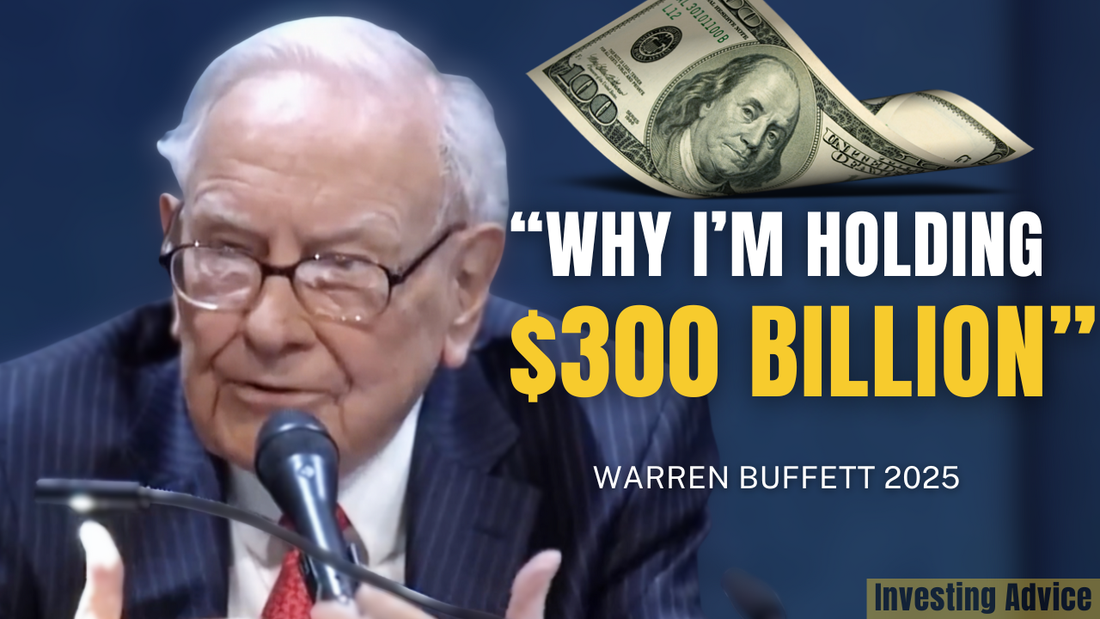
Warren Buffett Explains Why He’s Holding $300 Billion in Cash | Berkshire 2025
[Transcript]
BECKY QUICK: This next question comes from Advait Prasad (PH) in New York. He writes, “Today, Berkshire holds over $300 billion in cash and short-term investments, representing about 27% of total assets, a historically high figure compared to the 13% average over the last 25 years. This has also led Berkshire to effectively own nearly 5% of the entire U.S. Treasury market. Beyond the need for liquidity to meet insurance obligations, is the decision to raise cash primarily a de-risking strategy in response to high market valuations? Or is it also a deliberate effort to position Berkshire’s balance sheet for a smoother leadership transition, providing Greg Abel with maximum flexibility and a clean slate for future capital allocation decisions?” And I will add one line from another shareholder, Mike Conway, who asks, “Are you encouraged you may see some fat pitches coming your way?”
WARREN BUFFETT: Well, I wouldn’t do anything nearly so noble as to withhold investing myself just so that Greg could look good later on. (Laughter & Applause) Now if he gets any edge of what I leave, I’ll resent it. (Laughter) Now the amount of cash we have, we would spend probably – we came pretty close to spending $10 billion not that long ago. For example I – but we would spend $100 billion I mean and those decisions are not tough to make when something is offered that makes sense to us, and that we understand, and offers good value and where we don't worry about losing.
And the one problem with the investment business is that things don’t come along in an orderly fashion, and they never will. I mean it isn't like every day. You know the long term record is sensational but that is not a product and I've been in – see I've had 200 trading days times 80 years, I mean 16,000 trading days. It would be nice if every day you got four opportunities or something like that and you know you could – and they were expected to be equally attractive. You know if I was running a numbers racket, you know every day would have the same expectancy of that I would keep 40% of whatever the handle was, and so the only question would be is how much we transacted. But we're not running that kind of a business.
And so we're running a business which is very very very opportunistic. And Charlie always thought I did too many things. He thought if we did about five things in our lifetime, we could we would end up doing better than if we did 50, and that we never concentrated enough. We would rather have if we've got $335 billion now in Treasuries, we would rather have conditions that are developed where we would have like $50 billion or something like that. But that just isn't the way the business works.
And we have made a lot of money by not wanting to be fully invested at all times. We don't think it's improper actually for people who are passive investors just to make a few simple investments and sit with their life – sit for their life in them. But we've made the decision to be in the business so we think we can do a little better than that by behaving in a very irregular manner.
But if you told me that I had to invest, well let's say that we have a roughly 40 billion a year coming in and we start with $335 (billion), if you told me I had to invest $50 billion every year till we got down to $50 billion that would be the dumbest thing in the world to invest in that manner. Things get extraordinarily attractive very occasionally. The long-term trend is up. Nobody knows – and I certainly don't know, Greg doesn't know, Ajit doesn't know, nobody knows what the market is going to do tomorrow, next week, next month. And nobody knows what business is going to do tomorrow, next week or next month, but they spend all their time talking about it because it's easy to talk about but it has no value. I've never found anybody I want to listen to on the subject. (Laughter)
On the other hand, I found the leafing through things like that big Japanese book that I can't read anymore, that’s a treasure hunt. And every now and then you find something. And occasionally, very occasionally – but it’ll happen again, I don’t know when – it could be next week, it could be 5 years off, but it won’t be 50 years off – you will have – we will be bombarded with offerings that we’ll be glad we have the cash for. And it would be a lot more fun if it would happen tomorrow, but it’s very unlikely to happen tomorrow, very very unlikely to happen tomorrow. But it's not unlikely to happen in five years and then it gets – the probabilities get higher as you go along.
It’s kind of like death – I mean if you’re 10 years old, the chances that you’re going to die the next day are low. If you get to be 115 or something, it’s almost a cinch. (Laughter) Particularly if you're a male, I mean all the records are held by females in terms of age. I tried to get Charlie to have a sex change so he could test out whether – (Laughter) He did pretty well for being a male, I’ll put it that way. (Laughter)
Source: https://buffett.cnbc.com/2025-berkshire-hathaway-annual-meeting/
[YAPSS Takeaway]
Timing the market is useless.
No one, not even Buffett can predict what the market will do tomorrow or next month, so patience and discipline matter more than guessing.
